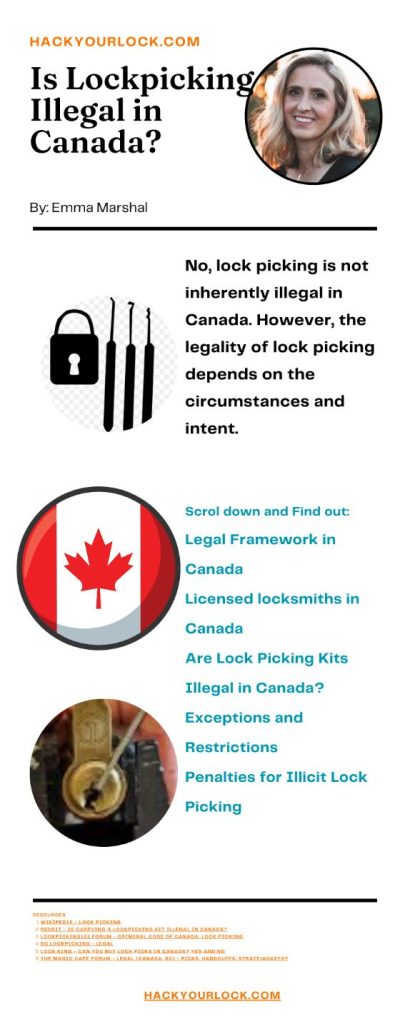Lock picking is the art of manipulating locks to open them without the original key. While it can be a valuable skill for locksmiths, security professionals, and hobbyists, questions often arise regarding its legality, especially in a country like Canada. People often ask, “Is Lockpicking Illegal in Canada?”
Intrigued by the art of lock picking and residing in the Great White North, you may be wondering if this skill is legal in Canada. Lock picking, often portrayed as a covert skill in movies and television shows, can raise questions about its legality and ethics. In this article, we will explore lock picking in Canada and its legal aspects, its uses, and the potential consequences of engaging in this activity.

Contents
Is Lockpicking Illegal in Canada?

No, lock picking is not inherently illegal in Canada. However, the legality of lock picking depends on the circumstances and intent.
Suppose someone possesses lock picking tools with the intent to use them for criminal purposes, such as breaking into a property unlawfully. In that case, it is illegal and can result in criminal charges.
In contrast, if individuals are licensed locksmiths, security professionals, or locksmithing hobbyists with no criminal intent, they can legally possess and use lock picking tools in their profession or hobby.
So, it’s essential to distinguish between the lawful and unlawful use of lock picking tools in Canada.
Legal Framework in Canada
In Canada, the legality of lock picking is primarily governed by the Criminal Code. According to Section 351 of the Criminal Code, it is illegal to possess lock picking tools with the intent to commit an offense. This means that merely owning lock picking tools is not a crime, but having them for nefarious purposes is.
| Legal Aspect | Description |
| Jurisdiction | Canada |
| Governing Law | Criminal Code of Canada |
| Relevant Section | Section 351 |
| Lockpicking Tool Possession | Legal, with conditions |
| Intent to Commit Offense | Illegal |
| Clarification | Merely owning lock picking tools is not a crime. However, possessing them with the intent to commit an offense is prohibited by law. |
Section 351 of the Criminal Code of Canada
| Section 351 of the Criminal Code of Canada | Details |
| Title | Possession of Break-In Instruments |
| Summary | Possessing tools or instruments designed for breaking into properties or vehicles intending to commit an offense is illegal. This includes lock picking tools. |
| Key Provisions | – Prohibits the possession of tools specifically designed or adapted for breaking into properties or vehicles. – Encompasses lock picking tools, among others. |
| Intent Requirement | – Requires the intent to use these tools for unlawful purposes, such as burglary or theft. |
| Penalties | – Conviction can result in criminal charges, fines, and imprisonment. Penalties may vary based on circumstances, including the specific offense and prior convictions. |
| Exceptions | – Possession of such tools by licensed locksmiths or individuals with legitimate reasons (e.g., professional security personnel) is typically allowed. – Intent to use them for lawful purposes, such as locksmithing or security, is generally permitted. – Intent and context are crucial in determining legality. |
Licensed locksmiths in Canada
Licensed locksmiths in Canada are crucial in providing security and assistance to the public. They are permitted to possess and use lock picking tools as part of their profession, and this allowance is essential for their ability to perform their job effectively.
However, it’s important to note that not just anyone can become a licensed locksmith in Canada; they must meet stringent requirements to ensure they are responsible and trustworthy individuals.
1. Professional Expertise
Licensed locksmiths are highly trained professionals who specialize in various aspects of security, including lock installation, maintenance, and, yes, lock picking as well.
2. Rigorous Training
Individuals must undergo extensive training programs to become licensed locksmith in Canada. These programs cover the technical aspects of locksmithing, ethical considerations, and legal responsibilities.
3. Background Checks
Licensing authorities conduct thorough background checks to ensure that applicants have a clean criminal record and are of good moral character. This is a crucial step in maintaining the public’s trust.
4. Ethical Obligations
A strict code of ethics binds licensed locksmiths. They are expected to use their skills responsibly and only for lawful purposes.
5. Security Providers
Locksmiths are often considered essential partners in enhancing security. They help people secure their homes, businesses, and vehicles by offering expert advice and services.
Are Lock Picking Kits Illegal in Canada?
Lock picking kits, which include tools designed for bypassing locks, are not inherently illegal in Canada. However, their legality depends on the intent and context of their possession and use.
1. Licensed Locksmiths
As mentioned earlier, licensed locksmiths are allowed to possess and use lock picking tools as part of their profession. They use these tools to help people regain access to their properties when locked out or upgrade security systems.
2. Hobbyists and Enthusiasts
Individuals interested in lock picking as a hobby or for educational purposes can legally possess lock picking kits in Canada. However, they should use these tools responsibly and ethically, ensuring their activities do not violate laws.
3. Intent Matters
The key factor in determining the legality of lock picking kits is intent. If someone possesses these tools intending to commit a crime, such as breaking and entering, burglary, or theft, it becomes illegal, and they can face criminal charges.
Can You Buy Lock Picks in Canada? Yes AND No? Let’s figure out further.
Exceptions and Restrictions
While lock picking tools are generally legal to possess, there are restrictions in place. Using these tools to commit crimes, break into properties, or engage in malicious activity is strictly prohibited and can result in criminal charges.
| Legality of Lock Picking Tools | Lock Picking tools are generally legal to possess. |
| Restrictions | Using these tools for criminal activities is strictly prohibited and can result in criminal charges. |
| Prohibited Activities | – Committing crimes |
| – Breaking into properties | |
| – Engaging in malicious activities | |
| Consequences | Criminal charges, fines, and potential imprisonment. |
Ethical Considerations
Lock picking, as a skill, inevitably raises ethical concerns, particularly in the context of Canada. It can easily be perceived as a craft that has the potential to facilitate illegal activities, such as burglary and theft.
The very nature of lock picking, the ability to open locks without proper authorization, often leads to questions about its ethical implications. In response to these concerns, it becomes paramount for individuals who practice lock picking to adhere to responsible and ethical use principles.
One key aspect of this ethical landscape is understanding the legal framework in Canada. The question of whether lock picking is legal in Canada is a pertinent one. The answer lies in the intent and purpose behind the possession and use of lock picking tools.
In Canada, lock picking is not inherently illegal; however, it’s the intent that matters. Possessing lock picking tools with the intent to commit an offense, such as breaking and entering, is strictly prohibited under Section 351 of the Criminal Code.
Therefore, to navigate the ethical considerations surrounding lock picking in Canada, individuals must ensure that this skill is responsible, lawful, and aligned with the principles of ethics and legality.
Educational and Hobbyist Use
Many individuals are drawn to lock picking as a hobby or for educational purposes. Lock picking can be a fascinating skill to learn and can help people understand the mechanics of locks better.
Penalties for Illicit Lock Picking
Engaging in lock picking with criminal intent can lead to severe consequences, including criminal charges, fines, and imprisonment. It is essential to recognize the boundaries of legality when practicing this skill.
| Penalties for Illicit Lock Picking in Canada | Details |
| Criminal Charges | Engaging in lock picking with criminal intent can result in criminal charges under the Criminal Code of Canada. |
| Types of Offenses | – Lock picking intending to commit a crime, such as burglary or theft. – Use of lock picking tools during the commission of a criminal offense. |
| Severity of Penalties | The severity of penalties may vary depending on the specific offense, prior convictions, and other factors. |
| Fines | Conviction for illicit lock picking can lead to substantial fines, which can vary in amount depending on the circumstances. |
| Imprisonment | In severe cases, individuals engaged in illicit lock picking can face imprisonment, ranging from months to several years, based on the gravity of the offense. |
| Criminal Record | A conviction for illicit lock picking can result in a criminal record, which can have long-term consequences on employment and other aspects of one’s life. |
| Legal Consequences | The legal consequences of engaging in illicit lock picking can be severe and impact an individual’s future prospects and freedom. It is essential to recognize these boundaries. |
Before we conclude, would you like to be part of a healthy discussion on Is carrying a lockpicking kit illegal in Canada? I guess, YOU DO!!!
Conclusion
“Is lock picking illegal in Canada?” Lock picking’s legality depends on intent. While possessing lock picking tools isn’t inherently illegal, using them for criminal purposes, like breaking and entering, is strictly prohibited under Section 351 of Canada’s Criminal Code.
Responsible use is vital, with licensed locksmiths and enthusiasts navigating the legal boundaries. Criminal charges, fines, imprisonment, and lasting criminal records underscore the consequences of illicit lock picking, emphasizing the importance of ethical and lawful practices.
FAQ’s
Is owning lock picking tools illegal in Canada?
Owning lock picking tools is not illegal in Canada, but possessing them with criminal intent is.
Can I learn lock picking as a hobby in Canada?
Yes, lock picking can be pursued as a hobby or for educational purposes, provided it is done responsibly and ethically.
Are there any legal locksmith training programs in Canada?
Yes, there are licensed locksmith training programs in Canada for those interested in pursuing a career in locksmithing.
What are the penalties for illegal lock picking in Canada?
Engaging in illegal lock picking activities can result in criminal charges, fines, and imprisonment.
How can I improve the security of my locks?
Understanding lock picking can help improve lock security. Consult a professional locksmith for advice on enhancing your security measures.
Resources
- Wikipedia – Lock picking
- Reddit – Is carrying a lockpicking kit illegal in Canada?
- LockPicking101 Forum – Criminal Code of Canada: Lock Picking
- BC Lockpicking – Legal
- Lock King – Can You Buy Lock Picks in Canada? Yes AND No
- The Magic Cafe Forum – Legal (Canada, BC) – Picks, Handcuffs, Straitjackets?
